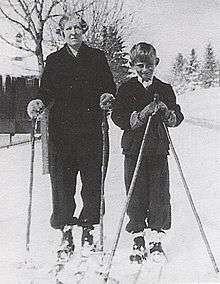Dehra Parker
| The Right Honourable Dame Dehra S. Parker DBE, GBE | |
|---|---|
 Dame Dehra skiing with her grandson, James Chichester-Clark, in Switzerland (1931) | |
| Parliamentary Secretary to the Ministry of Education | |
|
In office 1937–1944 | |
| Minister of Health and Local Government | |
|
In office 1949–1957 | |
| Preceded by | William Grant |
| Succeeded by | Jack Andrews |
| Member of the Northern Ireland House of Commons | |
|
In office 1921–1929 | |
| Preceded by | Seat Created |
| Succeeded by | Seat Abolished |
| Constituency | Londonderry |
| Member of the Northern Ireland House of Commons | |
|
In office 1933–1960 | |
| Preceded by | James Lenox-Conyngham Chichester-Clark |
| Succeeded by | James Chichester-Clark |
| Constituency | South Londonderry |
| Personal details | |
| Born |
13 August 1882 Dehradun, British India |
| Died |
30 November 1963 (aged 81) Castledawson, Northern Ireland |
| Nationality | British |
| Political party | Ulster Unionist Party |
| Spouse(s) |
Robert Chichester (d.1921) Admiral Henry Parker |
| Children |
Robert Marion |
| Religion | Anglican |
Dame Dehra S. Parker, GBE, PC (NI) (13 August 1882 [1] – 30 November 1963) was the longest serving woman MP in the Northern Ireland House of Commons.
Family life
Dehra Kerr-Fisher was born in a military hospital in Dehra Dun, north of Delhi, India, in 1882, the only child of James and Annie Kerr-Fisher. Her father, a native of Kilrea, County Londonderry, was a successful financier.[2] She was educated in the United States, where her father held extensive property holdings, and in Germany.[3] The surname has been spelled, alternatively, as Ker-Fisher or Ker Fisher.[4]
Marriages
She was married on two occasions, firstly to Lieutenant-Colonel Robert Peel Dawson Spencer Chichester, MP[2] (died 1921) with whom she had one son and one daughter, Robert James Spencer Chichester (1902-1920) and Marion Caroline Dehra Chichester (1904–1976).[3] She was predeceased by her son. She married, secondly, Admiral Henry Wise Parker (CB, CMG) on 4 June 1928.[5]
Political career
Dame Dehra was first elected as a Member of Parliament for Londonderry, as Dehra Chichester (which she was known as prior to her second marriage in 1928), in the Northern Ireland general election, 1921. She stood down at the 1929 election just before her second marriage but was elected unopposed as Dehra Parker in the 15 March 1933 by-election for the South Londonderry constituency following the death of her son-in-law James Lenox-Conyngham Chichester-Clark, and served until her resignation on 15 June 1960. Her grandson, James Chichester-Clark, was elected unopposed at the subsequent by-election. He later served as the fifth Prime Minister of Northern Ireland from 1969 to 1971.
From her re-election in 1933 until her retirement in 1960, she faced opposition only once. During the 1949 Northern Ireland General Election, with anti-partition agitation a common theme across the region, she was opposed in South Londonderry by a Nationalist Party candidate, T.B. Agnew, whom she defeated. She was a Parliamentary Secretary to the Ministry of Education from 1 December 1937 to 15 March 1944. She was also Chair of the Northern Ireland General Health Services Board from 1948 to 1949. She served as Minister of Health and Local Government from 26 August 1949 to 13 March 1957 and became a member of the Privy Council of Northern Ireland in 1949.
She was elevated to Dame Commander of the Order of the British Empire in the 1949 Birthday honours "for public services", having previously been awarded the OBE,[6] and was advanced to be a Dame Grand Cross of the Order of the British Empire in 1957.
Her promotion to the Cabinet under Viscount Brookeborough was part of his reforming premiership; his predecessor having been criticised for appointing very elderly members to Cabinet. She was the first woman to serve in the Northern Ireland Cabinet.
Extra-Parliamentary activities
Outside of parliamentary activities Dame Dehra was a long-serving local councillor on Magherafelt rural district council, president of both the Northern Ireland Physical Training Association and the Girls' Training Corps, and chairman of the Ancient Monuments Advisory Committee. In 1944 Parker was appointed senior vice-chairman of the Council for the Encouragement of Music and the Arts (CEMA NI), and in 1949 she succeeded Sir David Lindsay Keir as President for CEMA, a position she held until 1960.[7]
Later life
She died at her home, Shanemullagh House, Castledawson, County Londonderry, on 28 November 1963, at age 81. She was interred two days later in the grounds of Christ Church, Castledawson.
References
- ↑ Oxford Dictionary of National Biography
- 1 2 The Stormont Papers
- 1 2 Oxford Dictionary of National Biography
- ↑ Peerage.com
- ↑ Biographies of Members of the Northern Ireland House of Commons; accessed 13 April 2016.
- ↑ London Gazette notice of Dehra Parker's damehood (DBE)
- ↑ "Annual Report". Council for the Encouragement of Music and the Arts in Northern Ireland: 4. 1960.
| Parliament of Northern Ireland | ||
|---|---|---|
| Preceded by position created |
Member of Parliament for Londonderry 1921 - 1929 |
Succeeded by constituency split |
| Preceded by James Lenox-Conyngham Chichester-Clark |
Member of Parliament for South Londonderry 1933 - 1960 |
Succeeded by James Chichester-Clark |
| Political offices | ||
| Preceded by William Grant |
Minister of Health and Local Government 1949–1957 |
Succeeded by Jack Andrews |